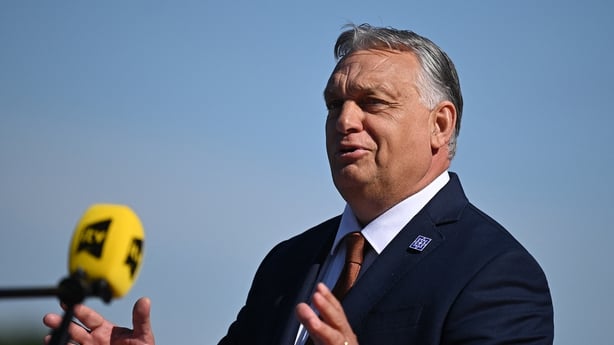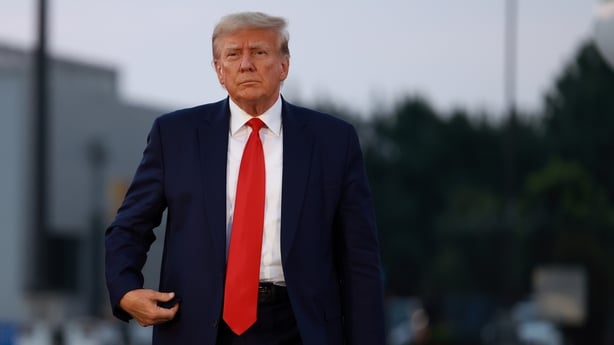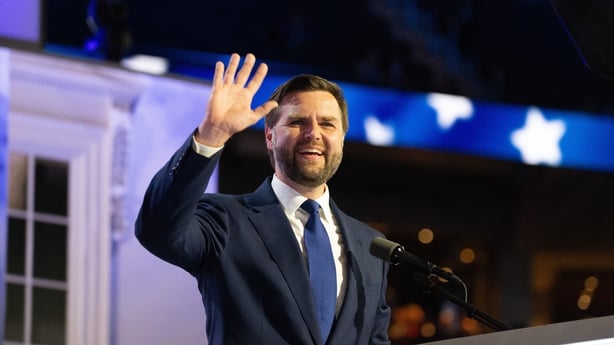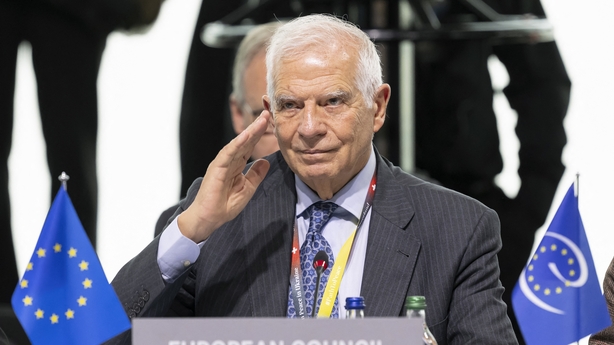Hungary's Prime Minister Viktor Orbán has a special place among Donald Trump's small circle of European allies.
Only two days before last weekend's assassination attempt on Mr Trump, the Hungarian leader met the former US president at his Mar-a-Lago estate in Palm Beach.
The two populist leaders discussed the war in Ukraine, which Mr Trump has previously said he would bring to an end in a single day, if re-elected as US president. Mr Orbán, his staunchest ally in the EU, posted on X that the former US president is a "man of peace" and will "do it again!".
The meeting in Mar-a-Lago on 11 July was the last stop on Mr Orbán's self-described "peace missions" around the world, capping off his week of meetings with leaders in Kyiv, Moscow and Beijing.
For many EU leaders and senior officials, Mr Orbán's talks with Mr Putin over the war were an affront to EU values and the bloc's commitment to supporting Ukraine against Russian aggression.
Moreover, Mr Orbán's rogue talks occurred just as Hungary had taken over the six-month rotating presidency of the Council of the EU, making it look as though he was mediating on behalf of the bloc. Not since 2009, the year the Lisbon Treaty was ratified, has the rotating national presidency negotiated foreign policy on behalf of the EU.

Newly re-elected European Commission President Ursula von der Leyen labelled Mr Orbán’s visit to Moscow as "nothing but an appeasement mission" in her speech in the European Parliament on Thursday.
As a kind of informal penalty for Mr Orbán's actions, the Commission announced earlier this week that it will be "represented at senior civil servant level only" during informal meetings of the Council during Hungary's presidency, not by European Commissioners.
And the reaction has continued. On Friday, Denmark became the seventh EU member state to announce that it would not send its ministers to meetings in Hungary for the duration of the presidency, following the positions of Poland, Sweden and the three Baltic States.
Lukács Csaba, managing editor of Magyar Hang, a liberal-conservative newspaper in Budapest, told RTÉ News that, by meeting Mr Putin, Chinese premier Xi Jinping, and Mr Trump, Mr Orbán had wanted to show Hungarians that "he is not isolated" and is "a sovereign leader".
Critics of the Hungarian government believe its calls for peace simply mean that Ukraine would have to cede its territory occupied by Russia.
Kyiv was also annoyed that Mr Orbán appeared to be mediating without its involvement or approval.
But while Mr Orbán is currently an outsider in EU circles for all of the above reasons, he stands to become Mr Trump's man in Europe if the Republican nominee wins the US presidential election in November. Centrist EU leaders, those who have been Ukraine's strongest supporters, would, for a second time in less than a decade, have to adapt to another four years of tense relations with an isolationist administration in Washington.
There are simply a lot of synergies between the Mr Orban's and Mr Trump's conservative camps.

Both politicians oppose immigration, favour nationalism over internationalism, slam progressive thinking and liberalism, and reference Christian values to appeal to much of their base.
In Hungary, Mr Orbán set about building, what he once termed, an "illiberal democracy", cutting funding for liberal universities and installing a public media and judiciary that is loyal to his populist Fidesz party. It is an approach to governance that would appeal to many attendees at this week's Republican National Convention.
On the war in Ukraine, neither politician is an obvious supporter of Kyiv.
Mr Orbán opposes military aid for Ukraine and his government has maintained close economic and political ties with the Kremlin, going against EU policy. At the same time, Budapest has maintained frosty relations with Kyiv, stemming from a disagreement over the language rights of the Hungarian minority in Ukraine.
Mr Trump's promise of ending the war is vague, but his few words on bringing about an "easy deal" to end the conflict, have clung to a neutral line, not too dissimilar to Mr Orban's calls for "peace". Like Mr Orban, the former US president has avoided criticising Russian President Vladimir Putin.
Mr Trump's running mate for November's election, J.D Vance, has gone farther still.
"I don't really care what happens to Ukraine one way or another," he told Mr Trump's former chief advisor Steve Bannon in a podcast interview in 2022.
Mr Vance has also said that he thinks Europe needs to look after its own defence needs and stop relying on American military support.
Mr Vance's bizarre comment this week about the UK being the world's "first truly Islamist country" to hold nuclear weapons since Labour's election victory, though intended as a joke, gave a taste of the kind of caustic, undiplomatic remarks that centrist and left-wing European leaders could face if the Trump-Vance ticket wins November's race.
But Hungarian conservatives embraced the announcement of Mr Vance as the Republican vice presidential nominee.

"A Trump-Vance administration sounds just right," posted the Hungarian prime minister's political director, Balázs Orbán (no relation to Viktor Orbán), along with a photo of him and the VP candidate.
"Orban now has, like, double insurance in America if Trump wins because even the President and the Vice President are fans of him," said Mr Csaba.
Admired by many on the American right, Mr Orbán has spoken at CPAC events in the US in recent years, an annual gathering of American ultra-conservatives. Hungarian conservatives have also held their own CPAC events in Budapest over the past two years, inviting the likes of former Fox News host, Tucker Carlson, who, earlier this year, conducted a watery interview with Mr Putin.
Ukrainian President Volodymyr Zelensky said he had been unaware of Mr Orbán's plans to meet Russian President Vladimir Putin in the days following their meeting in Kyiv. The Hungarian government had also not informed the bloc’s other members of their prime minister's plans for rogue talks either.
On Thursday, at the European Political Community summit in Oxfordshire, Mr Zelensky made his most vocal criticism yet of Mr Orbán's so-called "peace missions".
"If someone wants to make some trips to the capital of war to talk and perhaps promise something against our common interests, or at the expense of Ukraine, or another country, then why should we consider such a person," said Mr Zelensky.
"The EU and NATO can also address all their issues without this one individual."
Josep Borrell, the EU’s head of foreign policy said on 5 July in a statement that Mr Orbán had "not received any mandate from the EU Council to visit Moscow", quickly distancing the EU from Mr Orbán's solo diplomacy efforts.

Mr Borrell also referenced that the Russian leader was indicted by the International Criminal Court for his role in relation to the forced deportation of children from Ukraine to Russia, a pointed reminder to Mr Orbán, if ever it was needed, of Mr Putin’s current standing among most of the world’s democracies.
The standoff between Brussels and Budapest could come to a head in late August when Hungary holds a summit for EU foreign ministers, with Politico reporting this week that Mr Borrell may plan to hold a separate summit for foreign ministers during on the same dates. That would give delegations an excuse to avoid the event in Budapest.
The reaction from senior EU officials effectively amounts to a boycott of any high-level talks for the remainder of the Hungarian presidency.
And there is one potential red flag for Mr Trump when it comes to Hungary: its government's close economic ties with China. It just does not tally with Trumpian protectionism, even stronger now with Mr Vance onboard - the Ohio senator is no fan of free trade agreements.
China is now the largest foreign investor in Hungary, with Chinese companies building a number of battery-producing factories and an electric car factory in the country.
According to reporting by Magyar Hang, the Hungarian newspaper, there are 20 flights per week between Budapest and seven major Chinese cities. In contrast, there are no direct fights between the Hungarian capital and the US, which says a lot about where Hungarian government's economic interests lie. (Budapest airport is also owned by the Hungarian government).
Hungary's presidency of the EU lasts until the end of the year. We may not have seen the last of Mr Orbán's diplomatic stunts.







